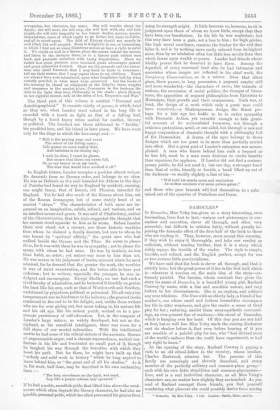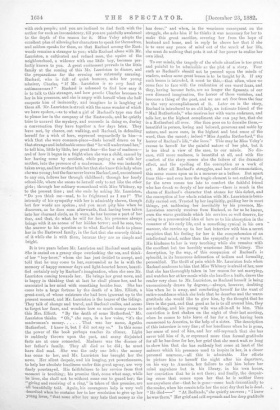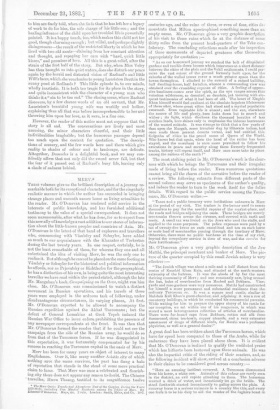DAMOCLES.* IN Damocles, Miss Veley has given us a story
interesting, even fascinating, from first to last,—unique and picturesque in con- ception and execution, clever all through, and often very powerful ; but difficult to criticise fairly, without greatly im- pairing the dramatic effect of the first-half of the bock to those who are reading it. They, however, must accept this warning, if they wish to enjoy it thoroughly, and take our verdict as sufficient, without reading further, that it is a story which richly repays the trouble of the reader. The style is simple, forcible, and refined, and the English perfect, except for one or two curious little provincialisms.
We have said that the book is clever all through, and that is strictly true; but the great power of it lies in the first half, which, is—wherever it touches on the main idea of the story—ex- tremely painful. The heroine, whose constant fear gives the story its name of Damocles, is a beautiful young girl, Rachael Conway by name, with a fine and sensitive nature, and very forlorn in her circumstances. She is an orphan, and without any near relations. She lives with an elderly lady, a friend of her mother's, one whose small and tedious formalities encompass her life in utter weariness, and give the reader a sense of tired pity for her; enduring, amidst these unsympathetic surround- ings, an ever-present fear of madness,—the sword of Damocles, which is hanging over her head. Of this fear you are not told at first, but so well has Miss Voley made the coming disclosure- cast its shadow before it, that even before hearing of it you are sensible of a painful pity for her, who "had divined more of the world's sadness than she could have experienced, or had any right to know."
, At the opening of the story, Rachael Conway is paying a visit to an old school-fellow in the country, whose brother,
Charles Eastwood, admires her. The persons of this family are amusingly and cleverly described, and every member of the perfectly ordinary and common-place group— each with his own little stupidities and common-placenesses- lives, and is a real individual character, as all Miss Veley's characters are, no matter how -slightly they are touched. As you read of Rachael amongst these friends, you find yourself wondering what pleasure she could possibly derive from mixing " Damocles. By Miss Veley. 3 vols. London: Smith, alder, and Co.
with such people ; and you are inclined to find fault with the author for such an inconsistency, till you are painfully awakened to the depth of the reason for it. Miss Veley adopts the excellent plan of allowing her characters to speak for themselves, and seldom speaks for them, so that Rachael among the East. woods remains a stranger to you; while Rachael alone with Mr. Lauriston, a cultivated and refined man, the squire of the neighbourhood, a widower with one little boy, becomes per- fectly known to you. A great excitement prevails in the little family at the coming of this Mr. Lauriston to dinner, and the preparations for the evening are extremely amusing. Rachael, who is full of quiet humour, asks her young admirer, Charles, "If Mr. Lauriston is so very fond of antimacassars ? " Raohael is ashamed to find how easy it is to talk to this stranger, and how gauche Charles becomes to her in his presence, and she is angry with herself when she half suspects him of insincerity, and imagines he is laughing at them all. Mr. Lauriston is struck with the same wonder of which we have spoken,—as to what a girl of Rachael's typo can find to please her in the company of the Eastwoods, and he quietly tries to unravel the mystery, and succeeds in doing so, during a conversation they have together a few days later. They have met, by chance, out walking, and Rachael, in defending herself for a wish of hers, expressed unguardedly to him—a wish that she were common-place—finds herself drawn on by that strange and indefinable sense that " he will understand her,"
• to tell him, little by little, her great fear—the fear of madness— and, of how it began in a fright when she was a child, caused by her having come by accident, while paying a call with her mother, into the presence of a madwoman. She was instantly taken away, and her mother tells her that she knew this lady when she was young; but the fear never leaves Rachael, and, unconfessed to any one, follows her through childhood ; through her lonely school-life, where she seems to herself only to act like the other girls ; through her solitary womanhood with Miss Whitney, up to the present time ; and she ends by asking Mr. Lauriston, " Do you think me—mad, to be frightened as I am ?" The intensity of his sympathy with her is admirably shown, though but few word d are spoken ; and you must pity him when he discovers, as he does soon afterwards, that having been taken into her charmed circle, as it were, he has become a part of her fear, and that, do what he will for her, his presence always brings with it an access of her hidden terror ; and he sees, too, the answer to his question as to what Rachael finds to please her in the Eastwood family, in the fact that she scarcely thinks of it while she is with them, because they are so simple and bright.
It is two years before Mr. Lauriston and Rachael meet again. She is seated on a grassy slope overlooking the sea, and think. ofher boy-lover," whom she has just decided to accept, and 'told that he may come to her, surrounded as he is with the memory of happy summer days and light-hearted hours, beauti- fied certainly only by Rachael's imagination, when she sees Mr. Lauriston coming towards her. He brings her great news, and is happy in thinking that at last he shall please her, and be associated in. her mind with something besides fear. She has come into a large fortune by the death of a Mrs. Elliott, a great-aunt, of whose existence she had been ignorant up to the present moment, and Mr. Lauriston is the bearer of the tidings. They talk of change and travel, and Rachael smiles, and seems to forget her fears, and wonders how so much money came to this Mrs. Elliott. "By the death of some Rutherford," Mr. Lauriston thinks. "Oh," she says, in a low voice, "it's the
madwoman's money That was her name, Agatha Rutherford. I knew it, but I did not say so." In this scene the power of the book perhaps reaches its climax. Light is suddenly thrown upon the past, and many disjointed facts are at once connected. Madness was the disease of her father's family. They all died as he did ; he must have died mad. She VMS the only one left ; the money has come to her, and Mr. Lauriston has brought her the news. Her silent despair, and his longing, yet powerlessness, to help her absolute loneliness under this great agony, are very finely pourtrayed. His faithfulness to her service from that moment is touching; his promise that, come what may, while he lives, she shall not be without some one to guard her ; the "giving and receiving of a ring," in token of this promise, are all beautifully told. Again, his courageous help is very well +described when he sustains her in her resolution to give up her young lover, "that none after her may hate that money as she
has done ;" and when, in the weariness consequent on the struggle, she asks him if he thinks it was necessary for her to make this great sacrifice, severing her from the hope of husband and home, and in reply he shows her that if she is to save any peace of mind out of the wreck of her life, she must do nothing that puts it out of her power to realise her Own ideal.
To our minds, the tragedy of the whole situation is too great and painful to be admissible as the plot of a story. Fear such as Rachael's should not be pressed upon the minds of readers, unless some great lesson is to be taught by it. If any such lesson is intended, it must be this,—that often, when we come face to face with the realisation of our worst fears, and they, having become facts, are no longer the figments of our own diseased imagination, the horror of them vanishes, and becomes a thing of the past, and we are set free from the fear in the very accomplishment of it. Later on in the story, Rachael is introduced to an old lady, an intimate friend of the "Mad Ruth erfords," who receives her with warm embraces, and tells her, as the highest compliment she can pay her, that she is a Rutherford all over. She then goes on to describe them,— beautiful in person, loving and beloved, generous and noble by nature, and more sane, in the highest and best sense of the word, than the sanest ; indeed "Miss Agatha Rutherford," the horror of Rachael's life," she loves." This may be Miss Veley's excuse to herself for the painful nature of her plot, but it is too ideal a view of the case, to our minds. No dis- ease, still more madness, is beautiful at all, and with the comfort of the story comes also the failure of the dramatic effect, and the spoiling of the conception as a work of art. After all Rachael's struggles, and her self-renunciation, this scene conies upon us in a measure as a bathos. But apart from this—and even here the tragic element is not entirely lost, for the news comes too late to comfort the faithful friend who has drunk so deeply of her sadness—there is much in the charm of Rachael's character that atones for this defect, and the conception of her whole relation with Mr. Lauriston is beau- fully carried out. Trusted by her implicitly, guiding her in most things, yet saddening her inevitably by his presence, Mr- Lauriston scarcely receives from Rachael, so far as he knows, even the warm gratitude which his services so well deserve, for owing to a preconceived idea of hers as to his absorption in the romance of his early life, and a something cynical in his own manner, she carries up to her last interview with him a secret suspicion that his feeling for her is the comprehension of an. intellectual mind, rather than the sympathy of a warm heart. His kindness to her is very touching while she remains with the excellent but too horribly wearisome Miss Whitney. The description, by the way, of this companion of Rachael's is splendid, in its humorous delineation of tedium and formality. personified. The thrill of pain which Mr. Lauriston feels when Rachael confesses to him that Miss Whitney is afraid of her, now that she has thoroughly taken in her reason for not marrying, and watches her at her meals while she handles a knife, draws the reader very close to Mr. Lauriston, as Rachael herself is being unconsciously drawn by degrees,—always, however, doubting him when he is away, and comforting herself for the want of entire confidence which she feels that he deserves and the warm gratitude she would like to give him, by the thought that he lives in the past, and that good as he is to all around him, they are nothing, and his young wife was all-in-all to him. This conviction is first shaken on the night of their last meeting, when he comes to take leave of her for a time, having been. summoned to America, to the help of a sister. The description of this interview is very fine ; of her loneliness when he is gone, her sense of need of him, and her self-reproach that she has never told him of it, or expressed more than formal gratitude for all he has done for her, her grief that she must wait so long to show him that she has suddenly lost some at least of the sadness which his presence used to inspire in her, in a closer personal nearness,—all this is admirable. Her efforts to picture him to herself the night after his departure, on his way to America, her failure to call him before her mind anywhere but in his library, in his 'own house, her conviction that he is not there; and finally, the despair- ing sense that comes upon her that he is neither there nor anywhere else—that he is gone—come back dramatically to the reader, when his cousin tells her the next day that he is dead. " He died—" "At Redlands," she quietly answers ; "I knew he was there." Her grief and self-reproach and her deep gratitude to him are finely told, when she finds that he has left her a legacy of work to do for him, the sole charge of his little son ; and the healing influence of the child upon her troubled life is powerfully painted. It is a happy touch, too, which makes this child not too good, though charming enough ; but wilful, and perhaps slightly disingenuous—the result of the restricted liberty in which he has lived with two old aunts—claiming from her constant attention and thought, and repaying her care with "hard, quick little kisses," and promises of love. All this is a great relief, after the strain of the first half of the story. But why, when Miss Veley has thus brought us into quiet waters, does she disturb our peace again by the horrid and distorted vision of Rachael's and little Will's faces, which she vouchsafes to young Lewiston Brett in the
sunny pond at Redlands This little episode is, to our minds, wholly inartistic. It is both too tragic for its place in the story, and quite inconsistent with the character of a young man who thinks it a sin to be too sad." The closing scene, where Rachael discovers, by a few chance words of an old servant, that Mr. Lauriston's beautiful young wife was worldly and hollow, explaining thus all that was before incomprehensible to her and throwing him upon her love, as it were, is a fine one.
However, the reader of this notice must not suppose that the story is all sad. The conversations are lively and most amusing, the minor characters cheerful, and their little individualities laughable ; but the humorous passages depend
too much upon the context for quotation. The descrip- tions of scenery, and the few words here and there which give reality to shades of colour and to landscape, are delicate. Altogether, Damocles is a delightful book, and we may con- fidently affirm that not only did the sword never fall, but that the fear of it passed out of Rachael's busy life, leaving only a shade of sadness behind.



































 Previous page
Previous page